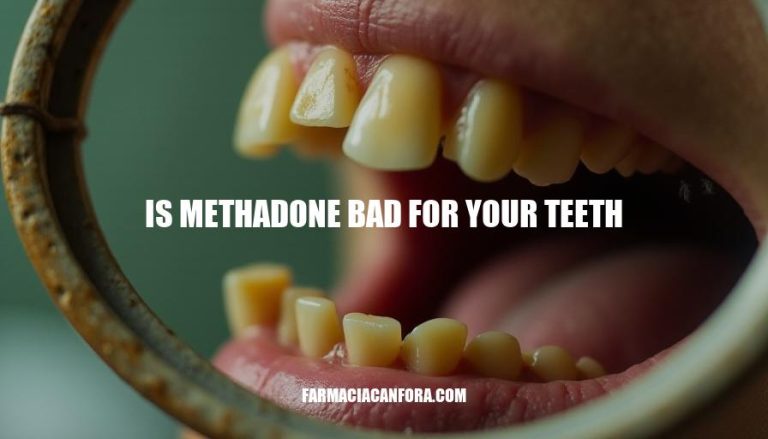


Methadone is used to treat opioid addiction and chronic pain. But it can also cause some serious dental problems. Dry mouth, tooth decay – these are just a few of the issues that can arise.
And if you’re on methadone therapy, it’s really important to know about these risks so you can take care of your teeth and prevent bigger health problems down the line.
Is methadone bad for your teeth? Methadone usage can lead to dental issues primarily due to its side effect of causing dry mouth (xerostomia). Saliva plays a crucial role in maintaining oral health by neutralizing acids produced by bacteria, washing away food particles, and preventing infection. When saliva production is reduced, it creates an environment where plaque can build up more easily, leading to tooth decay and gum disease.
Additionally, methadone can increase cravings for sugary foods and beverages, which further contributes to dental problems.
The lack of saliva also makes it harder to chew and swallow food, which can affect overall nutrition and health.
Moreover, methadone has a high acid content, which can erode tooth enamel over time. This erosion weakens the teeth and makes them more susceptible to cavities and other dental issues. Opioids, including methadone, are also associated with an increased risk of bruxism (tooth grinding), which can lead to tooth wear and jaw discomfort.
In summary, while methadone is an important medication for treating opioid addiction, it can have adverse effects on dental health due to dry mouth, increased cravings for sugary foods, enamel erosion, and bruxism.
A systematic review and meta-analysis published in BMC Oral Health in 2020 investigated the relationship between drug use and oral health. The study found that methadone use was associated with an increased number of decayed, missing, and filled teeth (DMFT) and periodontal disease. The odds ratio for DMFT was 4.11 (95% CI 2.07–8.15), indicating a significant increase in dental caries among methadone users.
Another study published in BMC Oral Health in 2019 examined the oral health status of opiate dependents, including methadone users.
The study revealed that 24.4% of participants were totally edentulous (without teeth), and none of the dentate patients had a healthy periodontium. The mean DMFT score was 20.3, with missing teeth comprising the largest part of the index.
Dr. Jeanette M. Tetrault, MD, highlighted in her research that methadone maintenance treatment (MMT) patients often exhibit vitamin-D deficiency, which can lead to musculoskeletal pain, osteoporosis, and periodontal disease.
The study found that 36% of MMT patients had evidence of vitamin-D deficiency.
The American Dental Association (ADA) also notes that methadone use can lead to dry mouth (xerostomia), which increases the risk of tooth decay, cavities, and oral infections. Poor oral hygiene habits, smoking, and drinking sugary beverages further exacerbate these issues.
These findings collectively suggest that methadone use is associated with significant oral health problems, including increased dental caries, periodontal disease, and tooth loss.
Methadone can lead to several dental problems, including tooth decay, dry mouth, and gum disease.
Tooth decay occurs because methadone reduces saliva production, creating an environment where plaque and bacteria thrive.
Dry mouth is a common side effect of methadone, which can further contribute to tooth decay and other oral health issues.
Gum disease can develop due to the lack of saliva and the increased presence of harmful bacteria in the mouth.
Is methadone bad for your teeth? Yes, it can be, due to these side effects.
To prevent dental issues while using methadone, it’s important to follow these practical tips:
Maintain Good Oral Hygiene: Brush your teeth at least twice a day using fluoride toothpaste and a soft-bristled toothbrush. Don’t forget to floss daily to remove plaque from between your teeth. Brushing your tongue can also help reduce bacteria and prevent bad breath.
Use Mouthwash: Consider using an antibacterial mouthwash daily to help kill bacteria and freshen your breath.
Stay Hydrated: Methadone can cause dry mouth, which increases the risk of tooth decay.
Drink plenty of water throughout the day to keep your mouth moist.
Chew Sugar-Free Gum: Chewing sugar-free gum can stimulate saliva production, helping to neutralize acids and wash away food particles.
Regular Dental Check-Ups: Visit your dentist regularly for check-ups and cleanings. Early detection and treatment of dental issues can prevent more serious problems down the line.
Avoid Sugary Foods and Drinks: Limit your intake of sugary foods and beverages, as they can contribute to tooth decay. Instead, opt for healthier snacks like fruits and vegetables.
Consider Fluoride Treatments: Ask your dentist about fluoride treatments, which can help strengthen your tooth enamel and protect against decay.
Quit Smoking: If you smoke, consider quitting.
Smoking can exacerbate dental problems and hinder the healing process.
By following these tips, you can help maintain good dental health while using methadone. Remember, it’s important to consult with your healthcare provider for personalized advice and recommendations.
Methadone, a medication used to treat opioid addiction and chronic pain, can have serious dental consequences due to its side effects of dry mouth, increased cravings for sugary foods, enamel erosion, and bruxism.
Studies have shown that methadone use is associated with an increased number of decayed, missing, and filled teeth (DMFT) and periodontal disease.
To prevent dental issues while using methadone, it’s essential to maintain good oral hygiene, stay hydrated, chew sugar-free gum, visit the dentist regularly, avoid sugary foods and drinks, consider fluoride treatments, and quit smoking.
By following these tips and consulting with a healthcare provider, individuals can mitigate the risks of methadone on their dental health.